Workshops at our Summit
The workshops at Uppsala Health Summit provide opportunities for collaboration with fellow delegates from a diverse range of professional fields and roles in society. Together, you will develop suggestions that will contribute to the implementation of research and innovations for improving global health. Each session will be led by an expert on the topic and start off with a brief inspirational presentation.
Workshop Programme 25-26 October 2022
Tuesday 25 October
- A: Food Planning for Sustainable Consumption and Healthier Living
- B: The SHIFT Framework for Health Equity in Food Environment Transformations
- C: Sustainable Animal Food Production in War and Peace
- D: Diet-Environment-Health Nexus
- E: Zero Hunger: Is Smallholder Farming the Solution? (online)
Wednesday 26 October
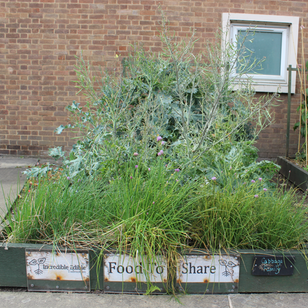
Photo: Ingrid Sarlöv Herlin
Background:
One of the main outcomes from food system activities from production, distribution to consumption is the contribution to food security. Food security can be described in the three components of food availability (amount, type and quality of food available for consumption), access (the ability to access what is required) and utilization (individuals or household capacity to consume and benefit from food). Although there is an availability and access to healthy food, it does not mean that people choose healthy food. The effects from unhealthy eating, often in combination with sedentary behaviour, are well-known: obesity, increased risk for cardiovascular diseases, diabetes, malnutrition, etc.
There are various means to change food behaviours. Information and education are commonly suggested as a way to push consumers in a healthier direction. But the toolbox for facilitating more healthy eating is more diverse than that. An emerging field of research and application is related to food planning – the integration of food perspectives into spatial planning and into local, regional, national, and global, food strategies. This can facilitate the transition into more sustainable foodscapes, the places where we find food from the plate (micro level) to regional or national foodscapes (macro level).
A central aspect in this workshop is how different tools in the planning toolbox can promote increased food awareness and a healthier food consumption. We meet with researchers and practitioners (from different foodscape levels) exemplifying the need and potential of food planning. We discuss how different applications can be implemented in practice and what is needed for the process. The ambition with the workshop is to illuminate the potential of food planning and develop a material for policy recommendations that could be presented in a policy brief. This also includes pointing out future developments of the food planning toolbox through research and exploration of practice.
Inspirational speakers:
- Dr Kevin Morgan, Professor of Governance and Development, School of Geography and Planning, Cardiff University, UK
- Dr Chiara Tornaghi, Associate Professor in Urban Food Sovereignty and Resilience, Centre for Agroecology, Water and Resilience (CAWR), Coventry University, UK
Workshop prepared by:
- Fredrik Fernqvist, Senior Lecturer, Department of People and Society/SLU Future Food, Swedish University of Agricultural Sciences
Read more about Fredrik Fernqvist in this interview - Håkan Jönsson, Visiting Professor, Department of People and Society/SLU Future Food, Swedish University of Agricultural Sciences
- Ingrid Sarlöv-Herlin, Professor, Head of Department, Department of Landscape Architecture, Planning and Management, Swedish University of Agricultural Sciences
- Andrew Gallagher, Coordinator of Food and Cities, SLU Urban Futures/SLU Future Food, Swedish University of Agricultural Sciences
- Annsofie Wahlström, Program director, SLU Future Food, Swedish University of Agricultural Science
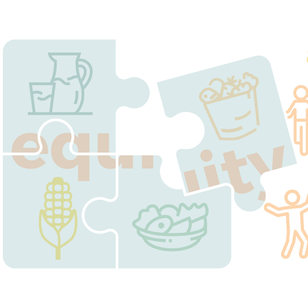
Photo: SHIFT Framework
Background:
The global population is struggling with malnutrition in unprecedented ways. Co-existing problems of underweight, overweight and micro-nutrient deficiencies are interacting with climate change, conflicts and other human and planetary factors that challenge health. A transformative change in our food environment is urgently needed to improve human and planetary health and well-being and to meet the Sustainable Development Goals (SDGs). In particular, the following SDGs are directly related to nutrition: zero hunger (SDG2), good health and well-being (SDG3), responsible consumption and production (SDG 12), life below water (SDG 14) and life on land (SDG 15). However, it is good to keep in mind that all SDGs are interconnected and impact health and nutrition in small and big ways. Food environments are of vital importance to achieving equity in health and nutrition. This brief aims to assist technical staff, such as programme developers and managers in achieving SDG goals through equity focused food environment transformations.
Why is food environment transformation an equity issue?
The food that people consume, particularly amongst the most vulnerable, is primarily determined by their food environments and not by ´choice´. Some groups are more exposed to unhealthy food environments; for example lack of financial resources decreases access to fresh fruits and vegetables, while inexpensive, low-nutrient, energy-dense food may be perceived as more attractive, placing them at higher risk of diet-related diseases. The right to equitable health and nutrition is grounded in a human rights framework that recognises each person has the right to adequate and nutritious food. This involves access to the resources necessary to produce, earn, and purchase food to prevent hunger and ensure good health and well-being. Food security policies and programmes require major paradigm shifts to elevate agency and sustainability as essential dimensions of food for all, together with availability, access, utilisation and stability.
Health equity is the notion that all people should have a fair opportunity to attain their full health potential, and that no one should be prevented from achieving this potential. Differences in health and nutrition status between groups are socially produced, systematic in their unequal distribution, avoidable and unfair. Promoting equity is therefore essential to delivering on the SDG promise of ‘leaving no one behind’. This translates to addressing the needs of vulnerable groups through actions that consider and evaluate equity.
(Source: The SHIFT Framework)
In this workshop, the SHIFT framework will be introduced and discussed with the help of a case example. The SHIFT framework assists technical staff through a four-step process and a compendium of good practices to develop context-relevant and equity-focused food environment transformation strategies. This tool developed by an international team of researchers comes in the form of an interactive pdf and an interactive website to guide users through the process.
Inspirational speakers:
- Oscar Rwegasira Mukasa, Researcher, Tanzania Food and Nutrition Center (TFNC)
- Meena Daivadanam, Associate Professor and Senior Researcher, Uppsala University
- Dheepa Jeyapalan, Manager, Healthy and Sustainable Food Systems, Victorian Health Promotion Foundation (Vichealth)
- Dr. Francesco Branca, Director, Nutrition and Food Safety, WHO
Workshop prepared by:
- Meena Daivadanam, Associate Professor and Senior Researcher, Department of Women’s and Children’s Health, Uppsala University
- Mathilde Sengoelge, Associate Professor, Department of Global Public Health, Karolinska Institutet (KI)
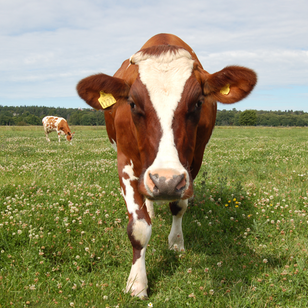
Photo: Karin Alvåsen SLU
This workshop will bring together scientists, experts in animal health, representatives from the industry, communication experts, and policymakers to explore how livestock production can be sustainable and resilient in times of peace but at the same time with a preparedness perspective. The workshop discussion aims to raise awareness among different stakeholders on how safe and nutritious food can be produced from sustainable livestock systems with a preparedness perspective.
Background:
The future holds challenges for the livestock industry, including climate change and risks of more extreme weather events. Political, societal, and environmental changes may influence the patterns of both the consumption and production of food and animal feed. The Covid-19 pandemic has highlighted vulnerabilities in the global food system and several actors emphasize the importance of sustainable and resilient food production. The importance of a robust food chain and flexible animal production is further emphasized in the light of armed conflicts such as the one taking place in Ukraine in 2022. Food production needs to continue even during times of change. Preparedness for the unknown requires flexible solutions to ensure the continued production of safe high-quality food using effective and environmentally friendly methods. We may need to adapt our food production to new systems, new animal species and new products. To do this, our animals need to be healthy and raised sustainably, with little negative impact on the environment and climate and a positive impact on biodiversity. The food system needs to be designed so that sudden changes do not compromise biosecurity, animal welfare or antimicrobial resistance.
The following questions will be discussed:
- The governance of transition towards sustainable, resilient, and competitive food production: What is the role of communication and public policy from the perspective of primary producers in animal production?
- Adaptation of production systems, species, and breeds; the need for agile solutions: How can farmers transform their production in times of change?
Inspirational speakers:
- Serina Ahlgren, Researcher, RISE
- John Young, Executive Director, INASP
- Dr Anne Katrine Bolvig Sørensen, Nutrition Scientist, Arla Foods
Workshop prepared by:
- Ylva Persson, Associate State Veterinarian, Associate Professor, Department of Animal Health and Antimicrobial Strategies, National Veterinary Institute (SVA)
Read more about Ylva Persson in this interview - Sigrid Agenäs, Professor, Department of Animal Nutrition and Management, Swedish University of Agricultural Sciences

Photo: Anna Roos; selma project; Getty images
This workshop invites researchers, policymakers, representatives from non-profit organizations and the private sector, communication experts, and other guests engaged in finding solutions for sustainable food consumption. We will discuss how we can achieve a transition of current dietary patterns into healthy diets with a reduced environmental impact on our society.
Background:
There is accumulating evidence that a nutritionally healthy diet is also largely a diet with lower environmental impact, compared to the average diet in the Swedish population. According to our estimates, only about 5 per cent of Sweden’s older population consumes a healthy diet. Recent dietary surveys from the Swedish Food Agency demonstrate that the diets of the Swedish population have room for improvement and would benefit from a higher intake of fruit and vegetables, legumes and nuts, wholegrain cereals and vegetable oils and fats, as well as a lower intake of red and processed meats and foods with a high content of salt, sugar and saturated fatty acids. There is thus a big opportunity for improved public health and reduced environmental impact through transformed dietary patterns.
Information about healthy diets is readily available from public authorities online (e.g., from the Swedish Food Agency and the Public Health Agency of Sweden), through mass media, etc. Still, there is a huge gap between evidence-based dietary advice and recommendations in the general population and actual consumption. Given such massive availability of reliable information about healthy and environmentally friendly diets and the persistent behavioral gap, the big question is how to transform the dietary habits of the whole society? What are the drivers of dietary change, and how can we improve syntheses of food-behavioral evidence? Therefore, this workshop will address this challenge and identify possible solutions from the macro to the micro levels of society – from political decisions at the central and local level, engagement of the private sector, via social innovations, etc. – to facilitate a population-wide adherence to healthier diets with reduced environmental impact.
Inspirational speakers:
- Annica Sohlström, Director-General, Swedish Food Agency
- Nicklas Neuman, Associate senior lecturer/Assistant Professor at Department of Food Studies, Nutrition and Dietetics, Uppsala University
- Carolin Zorell, Senior Lecturer at the Political Science department, Örebro University
- Alicja Wolk, Professor, Karolinska Institutet
Workshop prepared by:
- Alicja Wolk, Professor, Karolinska Institutet, Stockholm
Read more about Alicja Wolk in this interview - Eva Warensjö Lemming, Associate Professor, Senior Lecturer, Uppsala University
- Nicklas Neuman, Associate Professor, Associate Senior Lecturer, Uppsala University
- Emma Patterson, Adjunct Senior Lecturer, Karolinska Institutet, Stockholm and Nutritionist, Swedish Food Agency, Uppsala
- Stephanie Pitt, MSc, Research Assistant, Karolinska Institutet, Stockholm
- Carolin Zorell, Associate Professor, Senior Lecturer, Örebro University
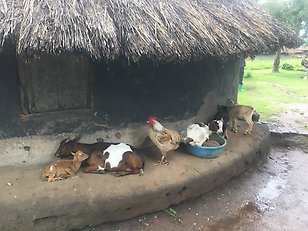
Photo: Erika Chenais
This workshop invites researchers, policymakers, and international organisations working with agriculture and food systems to discuss the future of smallholder farming, if sustainable small-scale agriculture can be achieved and whether sustainable industrialization is desirable.
Background:
Around the world, some 500 million smallholder farmers produce over 30 per cent of global food. Particularly in low-income countries, up to 70 per cent of food is produced by this category of farmers, who are generally poorer than farmers with larger land and livestock holdings. The majority of smallholder farmers grow crops and keep animals in mixed farming systems. They already face numerous risks to production, especially climate change which is projected to disproportionately affect them, make their livelihoods more precarious, and further exacerbate their food insecurity. In connection, the widespread poverty among smallholder farmers creates a negative spiral: it makes them particularly vulnerable to any shocks to their farming systems because it constrains their capacity to respond to pest and disease outbreaks and extreme weather events, thus causing significant crop and income losses and exacerbate food insecurity. These challenges place farmers under additional stress, both owing to direct reductions in agricultural productivity and through impacts on human health by exposing them to communicable and non-communicable diseases, mental health problems, and other health issues, which can have further implications for poverty and food and nutritional security.
Transforming small-scale agriculture into more industrialized and intensive forms of production providing more returns is often emphasized as a solution for rural development and poverty reduction. However, it is probably only smallholders who are already relatively less poor or have contacts with power elites who have the opportunity for such a change. Small-scale subsistence farming will probably continue to be the only option for most poor people to keep animals, farm the land and support themselves and their families beyond 2030.
The following questions will be discussed:
- How can we create political will and attention to support smallholder farmers in their local context, based on their circumstances?
- How can we better include smallholder voices and priorities in policy and research?
- How can smallholder farmers' access to markets be improved in a sustainable, equitable and fair way?
Inspirational speakers:
- Ayako Ebata, Research Fellow, Institute of Development Studies
- Eleanor Fisher, Professor, Director of Research, The Nordic Africa Institute (NAI)
- Isabelle Baltenweck, Program Leader: Policies, Institutions and Livelihood, International Livestock Research Institute (ILRI)
Workshop prepared by:
- Erika Chenais, Associate Professor, National Veterinary Institute (SVA)
- Klara Fischer, Associate Professor, Swedish University of Agricultural Sciences (SLU)
- Johanna Lindahl, Associate Professor, National Veterinary Institute (SVA), Swedish University of Agricultural Sciences (SLU) and Uppsala University (UU)
- Ylva Persson, Associate Professor, National Veterinary Institute (SVA)
- Jonas Johansson Wensman, Associate Professor, National Veterinary Institute (SVA)
- Assem Abu Hatab, Associate Professor, Swedish University of Agricultural Sciences (SLU) and The Nordic Africa Institute (NAI)
Read more about Assem Abu Hatab in this interview

Imagine if all you had to eat is maize and it is contaminated with a carcinogenic toxin. Will you feed it to your children? Although Sweden is not yet there, this is a reality for many parents globally, and a real conflict between food security and food safety.
Background:
Today cereals, including maize, wheat, and other grains, are important staples worldwide and thus vital for food security. In addition, they are used for animal feeds, and thereby also indirectly contributing to food and nutrition security, contributing to both SDG 2 and 3. However, increasing contamination of grains with various mycotoxins, negatively affects human health and animal production, and the stricter regulations towards mycotoxin levels allowed creates a conflict between these two SDG. There are estimates that more than half of the cereals produced globally contains detectable mycotoxins, and 25 % exceed regulatory limits. This is a major cause of post-harvest losses, food waste, and reduced economic and environmental sustainability.
Food security is a key concern in all low and middle-income countries (LMIC), and concerns over food safety, the environment and obesogenic effects of food are growing. Livestock can uniquely provide highly nutrient and energy-dense foods, particularly in areas where it is difficult to cultivate enough nutritious crops to sustain the people living there. One major threat to food security, food safety and feed safety are mycotoxins, produced by fungi, a problem that is growing in response to climate change. However, many other foodborne hazards may also pose a health hazard to humans and requires regulations.
With growing uncertainties in the world, there may in the future be more crisis situations (wars, droughts, floodings, pandemics etc.). During a crisis situation, we may also need to consider lowering our food safety standard, to ensure food security, but this may be difficult to communicate.
Aim of the workshop:
The aim of this workshop is to discuss the conflicts between interests and SDGs in terms of food safety, food security, economic development and environmental sustainability. We wish to discuss potential research needed to find solutions and to change policies, as well as create tools to minimize these conflicts and find potential synergisms.
Inspirational speakers:
- Dr Marta Hugas, Consultant and Former Chief Scientist at European Food Safety Authority, EFSA
- Dr. Timothy Robinson, Senior Livestock Policy Officer, FAO
Workshop prepared by:
- Johanna Lindahl, scientist, Swedish University of Agricultural Sciences (SLU) and International Livestock Research Institute
Read more about Johanna Lindahl in this interview - Johanna Dernfalk, Head of Section, National Veterinary Institute (SVA)
- Gunnar Andersson, Researcher, National Veterinary Institute (SVA)
- Nahar Nurun, Principal Regulatory Officer, Swedish Food Agency (Livsmedelsverket)
- Åsa Svanström, Microbiologist/Risk Assessor, Swedish Food Agency (Livsmedelsverket)
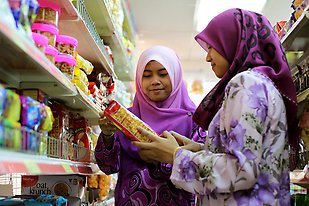
Background:
The pandemic of obesity synergizes with the pandemic of climate change contributing significantly to the ongoing human and environmental health crisis. To move society towards promoting sustainable health for its citizens as well as for the environment transformation of society with all its components is needed. In this context the food landscape, the foodscape, is an important contributing part of both pandemics. Therefore, much would be achieved towards sustainable health by mobilizing actors of the foodscape. However, there are challenges the food system to act in line with the goal to support sustainable human and environmental health.
Aim:
What is needed to achieve Foodscape change, moving the foodscape towards sustainable health? Foodscape change will be illustrated by representatives from one Swedish municipality and the actors in the food system by answering the following questions:
- What actors of food retail, distribution, and sale contribute to the local foodscape?
- How can actors of food retail, distribution, and sale contribute towards moving society towards sustainable health, and how can we monitor it?
Outcome:
Changing the foodscape is possible! By the example better understanding of the extent of the task of reforming the foodscape, in particular food retail, distribution, and sales, towards sustainable human and environmental health will be obtained. How to locally engage actors long-term for systemically transforming the foodscape; tools to map the local foodscape and identify its actors, gaps, and leverage points; the role of guidelines and corporate plans for transforming the foodscape; tools to follow actor transition by monitoring data-driven system change.
Inspirational speakers:
- Paula Frösell, registered dietitian and Senior Brand and Market manager, ICA Sweden
- Fredrik Eriksson, leisure consultant, Säffle Municipality
- Elin Bergström, Health Consultant, Friskvården i Värmland
- Dheepa Jeyapalan, Manager, Healthy and Sustainable Food Systems, Victorian Health Promotion Foundation (Vichealth)
Workshop prepared by:
- Peter Bergsten, Professor, Department of Medical Cell Biology (MCB), Research Group Peter Bergsten, Uppsala University
- Maja Engsner, PhD, Department of Medical Cell Biology (MCB), Research Group Peter Bergsten, Uppsala University
- Anna-Karin Quetel, Nutritionist, Sustainability Strategist, Swedish Food Agency (livesmedelsverket)

Photo: Glorcza, Getty Images
Background:
Talking about meat is talking about a burning issue that involves public health, sustainability, equality and global boundaries. The future of meat is a deeply personal and contested affair. How much and what types of meat should we eat, and how should the meat we eat be produced? What are the health implications of eating or not eating meat? How great an impact comes from meat production and meat consumption when it comes to planetary boundaries or planet health if you will?
As part of the ongoing two-year communications project Meat: the four futures, we will workshop four different meat and livestock futures - a plant-based meatless future, an alternative "meat" future without "traditional meat" but with insects and meat produced in labs instead, a “less meat” future, and an efficient meat 2.0 future, setting up stations to discuss the promises and pitfalls of each.
Particularly, we’d like to explore the future of meat and livestock from the perspective of workshop participants’, e.g. their home countries and regions, professions, and focus on the following questions: What evidence supports the futures to be developed and advocated for in different social, ecological and economic contexts (some futures may fit better into certain regions)? How much is the health status of the planet and the animals intertwined with human health? And what are the challenges when communicating different recommendations to varying regions across the world? We welcome everyone involved in these issues, e.g. public health officials, nutritionists, NGOs:s, policymakers and researchers.
This forum will benefit from the expertise of wise and committed workshop participants. Participants will bring home new insights and perspectives from around the world on meat as a future food – or not. Also, the insights from this workshop alongside the project can be formatted into a policy brief that outlines lessons learned and important considerations for the futures of meat and livestock production and consumption as it relates to public health across regional contexts.
Inspirational speakers:
- Nicole Rocque, Senior Innovation Specialist, The Good Food Institute (gfi) India
- Elin Röös, Senior Lecturer, Swedish University of Agricultural Sciences (SLU)
Workshop prepared by:
- Annsofie Wahlström, Director/Manager, SLU Future Food, and Project Coordinator of Meat: the four futures.
- Matthew Kessler, Project Coordinator TABLE, SLU Future Food/Department of Energy and Technology, Swedish University of Agricultural Sciences (SLU), Co-coordinator of Meat: the four futures
- Ylva Carlqvist Warnborg Communications officer at SLU, science journalist and podcaster. Core team member of Meat: the four futures
- Tara Garnett, TABLE Director, Oxford University
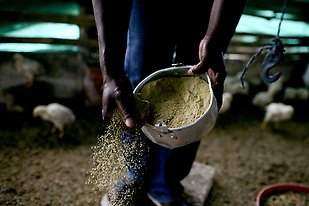
Photo: Charlotte Kesl, World Bank Flickr
The development and spread of antimicrobial resistance (AMR), sometimes termed the silent pandemic, is increasingly recognized as one of the biggest threats to global health, food security, and development. How do we reverse the increasing global trend with extensive and often inappropriate use of antibiotics to ensure resilient food systems that offer food for a growing population? This workshop invites stakeholders from the private, public and non-profit sectors to share best practices on preventing the development, transmission, and spread of antimicrobial resistance (AMR) in global animal husbandry.
Background:
In parallel with the increasing global demand for animal products, there is an increase in antimicrobial drugs as growth promoters or for disease prevention. Studies estimate that between the years 2010 and 2030, global antimicrobial consumption by animals bred for food production will increase by 67 %. This, in turn, is a key driver for the increasing levels of resistant bacteria threatening human and animal health as the number of drug-resistant infections is related to excessive use of antibiotics.
We acknowledge that there are significant variations in food systems regarding, e.g., geographical, socio-economic, and cultural differences. These differences may influence the dissemination of knowledge, choice of measures, and possibilities for enforcing regulations. All of which are important for infection prevention and control, use of antimicrobials in animal production, and approaches to minimize the risk for development and spread of AMR. To reduce AMR in global food production while ensuring healthy, sustainable, and economically resilient food systems, we are convinced that there is a need to understand and recognize the differences mentioned above.
How do we ensure food safety and economically resilient food production while reducing the use of antimicrobials? How can national and global funding best support the development and implementation of National Action Plans? What can we learn from those countries that have managed to maintain production and sales while reducing the use of antimicrobials?
This workshop invites stakeholders and actors from the private, public and non-profit sectors from different geographical, socio-economic, and cultural settings to jointly discuss and work towards sharing knowledge, best practices, and finding new solutions to AMR's complex and urgent problems. We especially encourage the animal husbandry and welfare sector, including veterinary medicine, and policymakers, to share knowledge and experiences as well as examples of evidence-based best practices, including soft and hard policies such as laws or regulations.
Expected outcomes of the workshop:
- A shared understanding of how different socioeconomic and cultural settings in global animal food production influences the implementation of national and international practices, policy recommendations, and regulations
- Propose actions that take into account differences in socioeconomic settings when developing antimicrobial stewardship policies
Inspirational speakers:
- Ulf Magnusson, Swedish University of Agricultural Sciences
- Julaporn Srinha, Head of Veterinary Products and AMR Containment Section, Divison of Animal Feed and Veterinary Products Control, Department of Livestock Development, Ministry of Agriculture and Cooperatives, Thailand
Workshop prepared by:
- Marmar Nekoro, Assessor, Swedish Knowledge Centre on Pharmaceuticals in the Environment, Swedish Medical Products Agency
Read more about Marmar Nekoro in this interview - Krister Halldin, Assessor, Swedish Medical Products Agency
